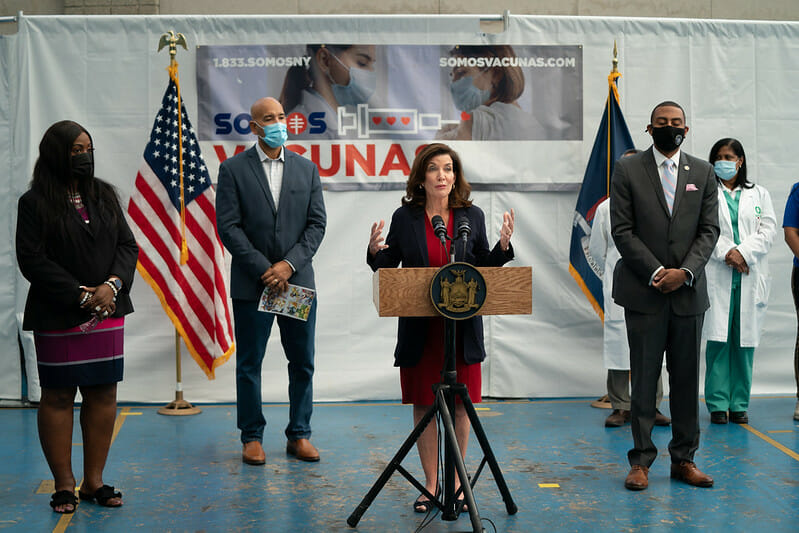
It’s been two months since New York lawmakers passed legislation that makes expansive changes to a longstanding wrongful death statute that could cause major problems for nursing homes. But the bill still hasn’t been signed into law, and no one seems to know when — or even if — it will happen.
In May, the state Legislature approved a bill known as the Grieving Families Act, which would broaden an 1800s-era law and make it easier for more people to sue nursing homes and other healthcare providers and claim a wider range of grievances. Under current law, claims for monetary damages are mostly limited to medical expenses, funeral expenses and loss of financial support.
Gov. Kathy Hochul (D, pictured) vetoed similar legislation last year, explaining in an opinion piece for the New York Daily News that the bill lacked “a serious evaluation of the impact of these massive changes on the economy, small businesses, individuals, and the state’s complex healthcare system.”
Lawmakers took a second crack at the bill this year and extended the statute of limitations from two years to three years from the date of death. The revised law would allow family members to sue facilities for alleged wrongful death dating back to July 1, 2018.
However, they also more narrowly defined “surviving close family members” as a spouse or domestic partner, children, foster-children, stepchildren and step-grandchildren, parents, grandparents, stepparents, step-grandparents, siblings or any person acting on behalf of the deceased’s estate.
“This bill is a slight improvement over the prior bill as it narrows the pool of wrongful death plaintiffs,” wrote Robert J. Cristiano, a Wilson Elser associate who represents nursing homes in medical malpractice cases, in the National Law Review. “While the new legislation removed the provision for additional damages for ‘disorders caused by such grief or anguish,’ it still allows the recovery of highly subjective damages for ‘grief and anguish’ of close family members.”
The Grieving Families Act expands the discovery requirements for pending and future litigation, which, Cristiano said, will require more work for providers and their representatives. Depositions will take longer since attorneys will have an “increased focus on … who visited patients in various health care facilities.”
“The court and both the plaintiffs’ and defense bars are already straining under the weight of clearing the existing litigation delayed by the COVID-19 pandemic and the swell of COVID-19 cases, so this additional discovery will require more personnel hours resulting in higher defense costs,” he added.
Skilled nursing providers and the state’s defense bar worked behind the scenes last year to encourage Hochul to veto the bill, McKnight’s Long-Term Care News reported in December. That bill extended the statute of limitations to 3.5 years and expanded the types of damages that can be awarded. A white paper published late last year estimated that awards up to at least $1 million per case were possible, which would send insurance premiums through the roof, the McKnight’s report noted.
In New York, the governor’s office must request legislation be sent to it for signature into law, instead of bills arriving at the governor’s desk to await signature. By not requesting a bill for signing by Dec. 31, the governor effectively vetoes it. So far, Hochul’s office has not asked for the Grieving Family Act so she can sign it, according to sector observers.




